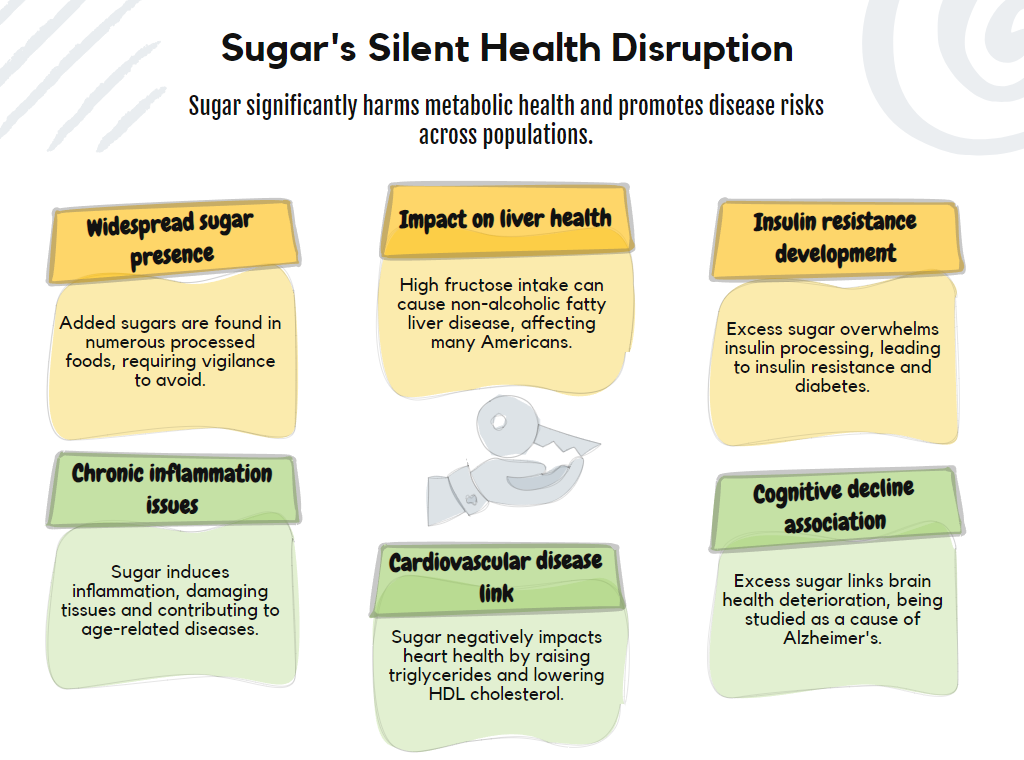
Sugar's Deadly Deception Undermines Human Health
Sugar's Deadly Deception Undermines Human Health
Sugar hides in plain sight. Everywhere you look.
From breakfast cereals to salad dressings, from "healthy" protein bars to your favorite pasta sauce, added sugars permeate our food supply so thoroughly that avoiding them requires near-constant vigilance. But while sugar's ubiquity might seem like a mere dietary nuisance, the scientific reality reveals something far more sinister: a systematic disruption of our metabolic function with cascading effects throughout the body.
The average American consumes approximately 17 teaspoons of added sugar daily, more than triple the recommended limit for women and double for men. This isn't just a matter of empty calories. The metabolic consequences extend far beyond simple weight gain, affecting everything from liver function to brain health in ways that fundamentally alter human physiology.
The Metabolic Machinery Under Attack
When sugar enters your bloodstream, your pancreas releases insulin to shuttle glucose into cells for energy. This elegant system evolved during scarcity, when sugar was rare and precious. But our modern sugar flood overwhelms this ancient machinery.
With repeated exposure to high sugar loads, cells gradually stop responding to insulin's signals. This insulin resistance forces the pancreas to produce more and more insulin to maintain blood glucose control. Eventually, the pancreas can't keep up. Blood sugar levels rise. Metabolic syndrome develops. And for millions, this cascade continues until full-blown type 2 diabetes emerges.
But insulin resistance represents just the beginning of sugar's metabolic sabotage.
The liver, tasked with processing excess fructose (a component of table sugar and high-fructose corn syrup), converts it to fat when overwhelmed. This process triggers non-alcoholic fatty liver disease, now affecting nearly a third of Americans. The condition mirrors alcoholic liver damage, despite the absence of alcohol consumption.
Meanwhile, sugar drives chronic inflammation throughout the body. It glycates proteins, creating advanced glycation end products (AGEs) that damage tissues and accelerate aging. It disrupts gut bacteria balance, compromises immune function, and alters hormone signaling pathways critical for maintaining metabolic equilibrium.
Beyond Blood Sugar
Sugar's metabolic disruption extends far beyond diabetes risk. Emerging research links excessive sugar consumption to cognitive decline, with some researchers now referring to Alzheimer's disease as "type 3 diabetes" due to the brain's impaired insulin response.
Cardiovascular health suffers too. Sugar increases triglycerides, lowers beneficial HDL cholesterol, and promotes arterial inflammation. The American Heart Association identified sugar as a significant contributor to cardiovascular disease long before popular opinion caught up.
Cancer researchers now recognize that many tumor cells preferentially metabolize sugar through the Warburg effect. While sugar doesn't directly cause cancer, high sugar diets and the resulting metabolic dysfunction create an internal environment where cancer cells may thrive more easily.
Perhaps most insidiously, sugar affects brain reward pathways similar to addictive substances. It triggers dopamine release, creating pleasure-seeking behavior patterns that make moderation extraordinarily difficult. This neurological impact explains why simple willpower often fails against sugar cravings.
A System Designed for Dependency
Understanding sugar's health impacts requires acknowledging the systems maintaining its dominance in our food supply. Food manufacturers have powerful economic incentives to include sugar in products. It's inexpensive, extends shelf life, masks the flavor of lower-quality ingredients, and creates the bliss point that keeps consumers coming back.
Industry-funded research has historically downplayed sugar's health risks while exaggerating the dangers of dietary fat. Internal documents from sugar industry groups reveal decades-long campaigns to influence nutrition science and public perception, creating confusion that persists today.
Agricultural policies subsidize sugar and corn (for high-fructose corn syrup) production, artificially lowering costs while making whole foods relatively more expensive. Food deserts in low-income areas limit access to fresh alternatives, making sugar-laden processed foods the accessible option for many communities.
This systemic approach to sugar distribution disproportionately affects vulnerable populations. Children, whose developing brains are particularly susceptible to reward-seeking patterns, face especially aggressive marketing. Lower-income communities have fewer resources to counter these influences, creating a social gradient in sugar-related health outcomes.
Reclaiming Metabolic Health
Addressing sugar's metabolic impact requires both individual and collective approaches. On a personal level, gradually reducing added sugar intake allows taste preferences to readjust. Reading ingredient labels and recognizing sugar's many aliases, from maltodextrin to fruit juice concentrate, becomes essential.
Prioritizing whole foods naturally limits sugar exposure while providing the fiber, protein, and healthy fats that stabilize blood glucose. Adequate sleep and stress management help regulate the hormones influencing hunger and cravings. Regular physical activity improves insulin sensitivity, creating a metabolic buffer against occasional sugar consumption.
However, individual action alone cannot counter the systemic forces promoting sugar consumption. Policy approaches like sugar taxes, marketing restrictions, improved food labeling, and restructured agricultural subsidies could create environments where healthy choices become easier.
Healthcare systems must prioritize nutritional education and metabolic health screening before disease develops. School meal programs need resources to provide real food instead of processed alternatives. Community design should ensure everyone has access to fresh food options.
The Bitter Truth
Sugar's metabolic disruption represents one of our time's most significant public health challenges. Its effects transcend simple calorie counting, altering fundamental biological processes in ways that accelerate aging and disease development.
The solution isn't demonizing all sweet foods or creating unsustainable restrictions. Instead, it requires recognizing sugar for what it truly is: a highly processed substance that human physiology wasn't designed to handle in current quantities.
By understanding sugar's metabolic impacts, we can make informed choices about its place in our lives. We can demand food systems that support health rather than undermine it. And ultimately, we can reclaim our metabolic function from sugar's silent but persistent disruption.
The human body demonstrates remarkable resilience when given the chance. Even after years of sugar-induced metabolic stress, reducing sugar intake can reverse many harmful processes. This biological forgiveness offers hope that we can heal the metabolic damage with awareness and action and create healthier futures.
